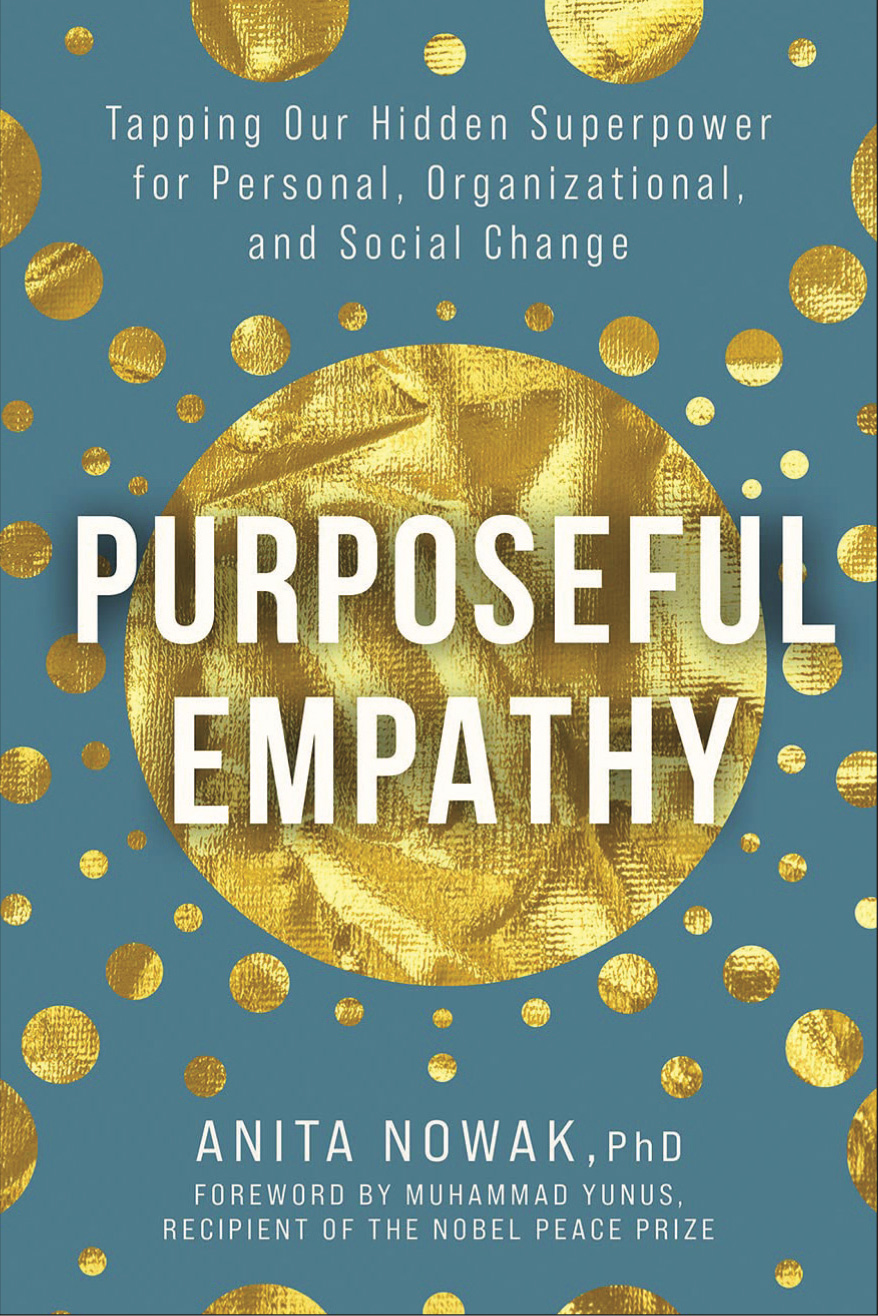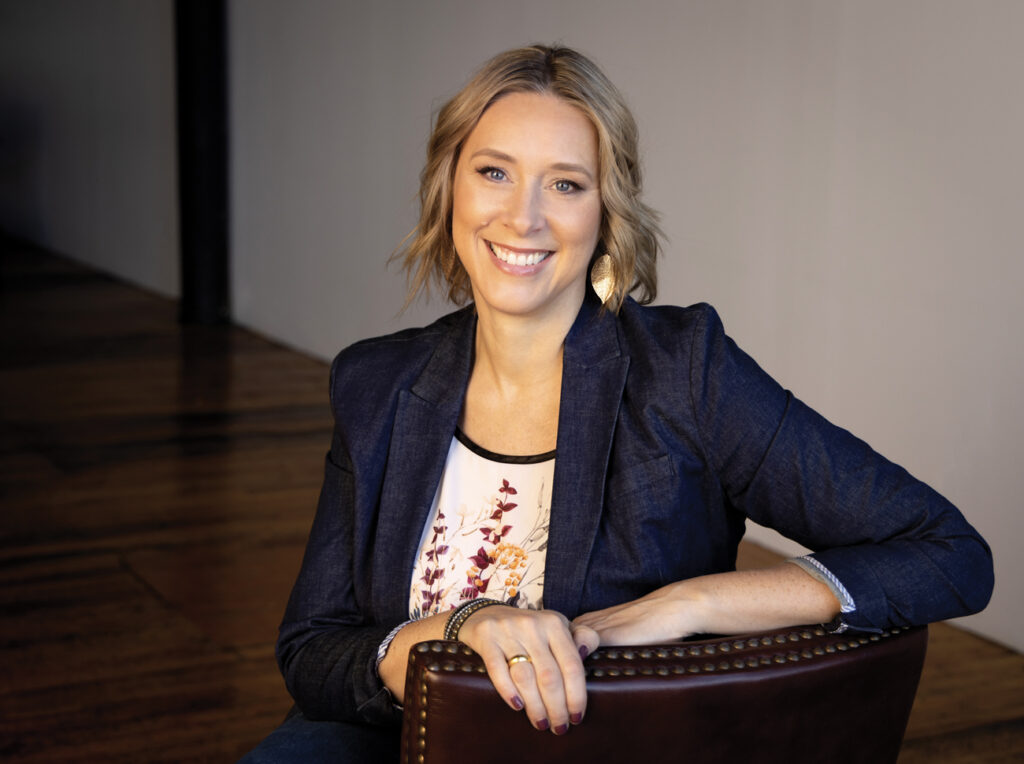Climate Empathy for the Next Generation

Purposeful Empathy
By Anita Nowak
Broadleaf Books, April 2023
Reviewed by Désirée McGraw
Politics – at its best and at its core – are ultimately about justice. True justice is rooted in empathy. When justice is codified into law, that is the business of legislators.
My own decision to become a law-maker – as a Member of Quebec’s National Assembly (MNA) elected last October to represent the citizens of Notre-Dame-de-Grâce – was motivated by my desire to support future generations and to set them up for success. This requires an inclusive society that values diversity; an open and innovative economy; and a healthy environment.
To achieve this triple bottom line of “sustainable development” we need to arrest the climate crisis. This is the social, economic, environmental and ethical challenge of our time: the decisions that countries, communities, corporations, citizens and their representatives make in this decade will impact people and the planet for millennia. The stakes could not be higher.
This is why, in 2020, I made a promise to myself and to my children that I would ramp up my efforts in combatting climate change. Having built a career in progressively senior leadership roles in a range of professions and sectors – from education and philanthropy to policy and advocacy – I had several options to consider. I ultimately decided to pursue active politics, having started my work in citizen engagement as a teenager.
A common thread in this has been educating, engaging, empowering and equipping the next generation with the knowledge, networks and skills to understand and tackle complex challenges – also known as “wicked problems” – at the national and global levels
In essence, this is a book for middle-aged people like me — ‘Gen X’ o help us understand, collaborate and ultimately innovate with the next generation of Millennials and Gen Z. Neuroscience tells us that young adults in particular are hardwired for innovation often exhibited as experimentation. We need to draw on this strength to address the “Ingenuity Gap” (the focus and title of an excellent book by Professor Thomas Homer-Dixon) in finding solutions to problems society has created on a scale and at a speed that are unprecedented in human history.
Right now, we are putting our youth in a difficult position – having to choose between their individual futures and their collective one. When I was president of Pearson College in Victoria BC, I heard some of our best students – with offers from Harvard, Stanford, Yale UBC, U of T, McGill – confess they could not justify going on to university when “the planet was burning,” They felt they needed to spend the next decade turning the climate crisis around.
They are not wrong about the next decade – science tells us the next 10 years are make or break on climate. But we have placed our youth are confronted by impossible choices – ones that put their respective individual futures at odds with their collective future. We shouldn’t just pay lip service to youth nor pass the puck to the next generation. We need to work in partnership with them.
This should not be the burden of youth. This is our fight – mine and the generations who have come before. We have the responsibility because we have the ability to respond.
This sense of responsibility is ultimately why I chose to run for public office. Last spring, on Earth Day 2022 in fact, I was asked by then-Liberal party leader Dominique Anglade, to serve as her point person on climate change and – given my background in economics and public policy – the economic and energy transition required to address it. Today, I’m privileged to serve as the Climate Critic for the Official Opposition.
This role in the Official Opposition is ultimately rooted in empathy – and enlightened self-interest. They are not mutually exclusive.
Recently, I’ve read a book called Purposeful Empathy, that could make a lasting impression on readers of all generations. The author, Anita Novak, is a professor in the Desautels School of Management at McGill, once again ranked Canada’top university in March and recently ranked one of the Top 50 in the latest World University Rankings for 2023. I came to know Anita Nowak when I recruited her as a Senior Fellow at the Jeanne Sauvé Foundation in my capacity as President and Executive Director.
Novak makes her case in a powerful and beautifully written preface: “The teacher in me wants to share what I have learned about empathy over the last 15 years. The coach in me wants to inspire you to live your best life. The rebel in me wants to shatter systems of oppression and injustice. The spiritual seeker in me wants to align with my calling. And the mother in me wants to protect and nurture our children.”
She adds that “sustained empathic action is not a regular part of our daily lives because we are locked into a paradigm of distraction, extraction, neocolonialism, systemic racism and other forms of oppression – all antithetical to empathy” … “that’s why empathy is not just spiritual by nature, but political too.”

But back on her brief, Nowak argues that “empathy alone is insufficient to build positive social change, therefore it is necessary for confronting social injustice as participants committed to putting an end to indignity and suffering.” She adds: “empathy alone can be a place to start and not to finish” therefore empathy needs to be purposeful or “intentional”.
She also points out that policymakers and activists in the arts, education, science and social entrepreneurship; manifest “to achieve peace, justice, equity and sustainability.” And she argues that “spiritual activism” simultaneously aims at economic and political transformation to “stop the destruction of the earth.”
One piece of constructive criticism: missing from her list of empathy superheroes are politicians. This addition may seem counter-intuitive given that politicians rate among the lowest in public opinion, and are widely perceived as self-serving. In my experience both working in politics, now actively so as a politician myself, this is rarely the case. For every self-serving politician, I give you a hundred who are more motivated by service. Politics is not just about ego, it can be about empathy. One does need an ego to put oneself forward as a candidate for office and aspire to win. But for politicians who truly seek to serve, who embrace public sevice, our campaigns, our elections, are not ends unto themselves; they are means to an end: to serve the common good.
The teacher in me wants to share what I have learned about empathy over the last 15 years. The coach in me wants to inspire you to live your best life. The rebel in me wants to shatter systems of oppression and injustice. The spiritual seeker in me wants to align with my calling. And the mother in me wants to protect and nurture our children.
While the tendency is to fixate on politics as a blood sport – and all that divides parties and politicians – there is no question that the most rewarding moments in political life are those that unite us in our common humanity. I think of the many motions unanimously adopted by parliamentarians of all political stripes; those that allow us to stand in solidarity with the planet and its people – whether it be locally (in the aftermath of violence, shootings, natural disasters) or globally (Afghanistan, Armenia, Haiti, Sudan, Ukraine and many others). These are the powerful moments when we speak and stand as one. These moments, these acts of solidarity are anchored in empathy, not ego.
Moving to her conclusion, Nowak cites Jeremy Rifkin, author of The Empathic Civilization, who argues that “empathy is the soul of democracy” and that “the evolution of eMpathy and the evolution of democracy have gone hand in hand throughout history.”
Due to “breakthroughs in biology and environmental research, the flaws of economic theories of separation and scarcity are now being exposed,” she writes, versus systems thinking that produces “abundance through collaboration…. No wonder leaders across the world are beginning to deploy regenerative agriculture, finance and economics.”
Purposeful Empathy is a great read – chalk full of compelling stories and powerful profiles. It’s also a brilliant book – as insightful as it is inspiring.
Désirée McGraw is the Liberal member of the Quebec National Assembly for Notre- Dame- de-Grâce and Critic for Environment & Climate Change, Parks & Wildlife well as Federal Relations. She served as President of the Jeanne Sauvé Foundation and then as President of Pearson College of the Pacific. Previously, she cofounded Al Gore’s Climate Reality Project in Canada and served as Senior Policy Advisor on International Cooperation in the Paul Martin Government.
